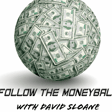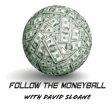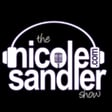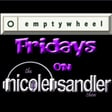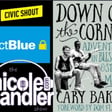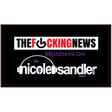Become a Creator today!Start creating today - Share your story with the world!
Start for free
00:00:00
00:00:01

FTMB Episode 6 Ken Davidoff
David interviews Ken Davidoff, former Sportswriter for the New York Post, Newsday about his career in Journalism, momentous events he covered and the "State" of MLB.
Transcript
Introduction to 'Follow the Money Ball'
00:00:02
Speaker
Welcome to Follow the Money Ball, a podcast at the intersection of sports and money. Here's your host, David Sloan. I'm David Sloan and I have opinions. I also have 44 years of experience as an agent for MLB players that back those opinions up.
Ken Davidoff's Career and Current Endeavors
00:00:19
Speaker
My guest today is Ken Davidoff, former writer for the New York Post. How are you doing today, Ken?
00:00:26
Speaker
I'm doing great, David. How about yourself? Excellent. Thank you. How is retirement treating you? It's got to be the first question I ask. It's wonderful. It's been almost a year and a half, and I'm just doing a bunch of projects, including an article here and there for The Post, but just able to enjoy life far more than I was when I was working. Really? Excellent. Anything that you can share as far as projects? Rather, you're not working on a book or anything, are you?
00:00:55
Speaker
I have a couple books in the works, nothing sold yet, so nothing to announce. And then I am teaching, excuse me, sports journalism at Endicott College up in Beverly, Massachusetts. I contribute to a weekly television show in New York called Yankees Nation. I'm the Yankees historian that's on
00:01:12
Speaker
WPIX channel 11 Sunday nights at 11 30 and just keep them busy with a bunch of other freelance writing stuff Well, then I would say you're hardly retired. It's not like retirement mindset It's not it's not like you're golfing and fishing but I guess the best way to put it is your your time is your own as opposed to you owe it to Your boss so to speak that is exactly right and I actually have started golfing just this summer I'd never played 18 rounds before now. I played three of them in the last couple months really
00:01:42
Speaker
Yeah.
00:01:44
Speaker
a lot of awful but it's really and the great thing about golf for me is like if you have two good shots you know a day like i come home beaming i'm thrilled uh-huh yeah as opposed to like tennis where i go and get my butt kicked most days i understand i understand well uh... i live a block off a golf course uh... that used to host the Honda classic unfortunately for me uh... my doctor advised me to sell my clubs uh... and uh... you know i had many friends over the years that had told me to sell my clubs but uh...
00:02:13
Speaker
They don't count as much as the doctors do. So let's get back to your pre-golf career. Let's put it that way.
Ken's Journey into Sports Writing
00:02:23
Speaker
So how did you get into sports writing? Were you always a writer? You played as a kid. Is that what got you into writing? Did you major in journalism in college? Any all of the above?
00:02:40
Speaker
So I grew up in Edison, New Jersey, and I grew up a huge baseball fan. And really, like in the mid to late 70s, you had to choose the Yankees because the Mets were unwatchable. So I was a Yankees fan for 77 and 78. And every morning, I would read the New York Star Ledger, which was our local paper. I had two writers, Moss Klein, who covered the Yankees, and then Dan Castellano, who covered the Mets. And I would read them every morning at breakfast.
00:03:10
Speaker
Yeah, I just got the feel for what their job was as beat writers. And they were just with the team day in, day out, on the road, at home. And I just saw how masterful they were, how knowledgeable they were about their teams. And I played baseball at age seven. I was self-aware to know. I wasn't going to make it professionally. I didn't make my high school team. So that wasn't happening. I said, but I do love baseball. I did love to write. So even back then at age seven, I said, I want to be Moss Cline. I'm going to be Dan Castellano.
00:03:40
Speaker
So I wrote for the high school newspaper. I attended the University of Michigan for college, at least partly with the idea of this going to a school with such huge sports programs would give me the opportunity around them and to write about them. And I wrote for the college newspaper at Michigan and I was on my way. You know, I had a very.
00:04:00
Speaker
linear path started small to small newspaper back in Jersey covering high school sports kind of climbed the ladder. I worked for the Bergen record actively. That's when you and I first met David when I when I got the Yankees beat there and went from the Bergen record to which is in Jersey to Newsday out of Long Island and then from Newsday over to the Post. But I wound up covering baseball exclusively for the high majority of my career from really like 1997 until I stopped early last year.
00:04:30
Speaker
So you started back in the days when people actually used to, the Stone Age is when they had a newspaper that you had to hold in your hands. Wow. As opposed to reading it on a tablet or a computer screen. Gee whiz. Imagine that, ladies and gentlemen.
00:04:48
Speaker
I have to say I had a similar experience. I grew up every day, checking the box scores, following teams, and I still, I have to admit, we get a daily newspaper here because to me, there's just something tactile to me.
00:05:07
Speaker
sitting down, eating my breakfast, drinking coffee, reading a newspaper. And I think a lot of people miss that experience. And to me, it just isn't the same reading it on the computer. And I'm sure that's just one of many changes that you've seen in your career and one of many things I want to explore as we go forward. So you wrote for your high school paper and that was covering all sports.
00:05:34
Speaker
Yeah, high school paper. I think we came out once every two months. So it was a little different routine and time commitment. Yeah, that was when I was in high school of my senior year, I wrote for a newspaper here that was eventually acquired by the Sentinel Corporation. And they had me covering spring practice because I had played against the guys that were coming up the year behind me.
00:06:01
Speaker
And I liked it. I enjoyed writing. The problem was what I didn't enjoy were the deadlines. So I can't imagine the relief you must be feeling now not having to deal with that and having your only deadlines being your own. I assume, and please correct me if I'm wrong, that when you got to Michigan and you were covering the Wolverines, that it was more than just baseball.
00:06:25
Speaker
because Michigan is not that much of a baseball school, even though they do have a pretty good baseball program for a school up in the Arctic like that. And their other teams are so much more well known, let's say. The football team and the basketball team are so much more well known than the baseball team.
00:06:46
Speaker
I assume you covered all those sports were the deadline issues, something similar to what you experienced later in your career, either in the Bergen paper or Newsday or the post.
Covering Michigan Sports and the Fab Five
00:06:59
Speaker
Absolutely, David. And I have to start with one thing you talk about the relief of not being on deadline anymore. I actually was pretty good with deadlines. But just this last week, I had a nightmare that I missed the deadline. I've been out a year and almost a year and a half. So that was pretty funny to bring that up. But yeah, so the truth is, going to Michigan
00:07:21
Speaker
again with the big time sports programs. If you remember the Chris Webber timeout game. Yeah. 1993. So that was my senior year. I was in the building. That was the Superdome in New Orleans. I was in the building actually sitting behind the foul line
00:07:35
Speaker
as Chris approached and he cut, so he called the timeout in front of me to my left. And that night we had serious professional deadlines. And you talk about the evolution of technology. We didn't even bring laptops with us. Back then it was like the radio check laptop. They called it the Trash 80. I think it was the T80. And we didn't even have that. It was dictation. I wrote out my article, my column longhand,
00:08:02
Speaker
and called it in to an editor in Ann Arbor. Oh, wow. That night, it was that was a legitimate professional deadline. And as I said, my senior year or so.
00:08:12
Speaker
let's say three, four months later, I was at a job interview in New Jersey, showed them that article and the editor kind of went over to me. What was your deadline? It was about an hour, hour and a half after the game ended. And the editor said, wow, like that, that's legit. That's too legit to quit. His name is Jim Miller. He hired me and gave me my first professional job. So that was a big break. Was that, was that,
00:08:37
Speaker
the first really, really big story you covered because there were some excellent Michigan teams back then. I mean, there still are to this day, but nonetheless, there were some excellent Michigan teams in that time period when you were there.
00:08:51
Speaker
Absolutely. We had Desmond Howard who won the Heisman Trophy during my four years. You talk about the baseball team. Do you know what hit the fan my freshman year? Because the coach got caught. So if you look back at Michigan baseball in the 80s, it was pretty remarkable. Barry Larkin, Chris Szabo,
00:09:08
Speaker
Jim Abbott Hal Morris all these guys now I don't know what each of them individuals up to but turned out that the Baseball team as a whole was you know was getting some money Yeah, you know, which would which would be fine nowadays with name and image likeness But that yet back then was a was a was a felony so the baseball coach got fired just as I was arriving on campus and
00:09:31
Speaker
Uh, in 1989. Uh, so, uh, yeah, I'm sorry, getting back to original question. Oh yeah. That, that whole year, I mean that, that the timeout game was by far the biggest individual story, but the fab five was ginormous. They were, they had made the championship game the year before they got killed by Duke in the championship game and all came back as sophomores. So they were a huge, huge story always.
00:09:56
Speaker
Well, the whole time they were there, they were big. I mean, they came in and were, I mean, big time hyped because they were such high profile high school kids and they all went to to the same program. And by the way, I'm sure that Michigan baseball team, they were the only team in the country that were getting paid under the table.
00:10:15
Speaker
Well, every other team was clean as a whistle. Cure as the driven snow as the saying goes. So you had those years at Michigan. What a great preparation for what you did. Again,
00:10:31
Speaker
No disrespect to MLB, no disrespect to the New York Yankees, obviously a huge tail that wags the dog sort of entity in regard to their particular sport. But to cover a program like Michigan, you certainly got a good head start as far as in comparison to your peers from other areas that would eventually be competing with you for jobs.
00:10:58
Speaker
So you went to the to the Bergen paper. That was the first one in New Jersey. Well, it was a small paper that the Bergen record owned called the News Tribune. OK, so you started at the News Tribune and were you covering only baseball there? Oh, no, no, I did all. It was all high school sports, very occasional small college sport.
00:11:19
Speaker
I said we did cover Rutgers, but like, you know, more experienced people cover Rutgers football. I covered some of the smaller sports at Rutgers, but primarily, I'm sorry, high school sports across the board. Rutgers plays football? So the focus was strictly on the local teams, if you were.
00:11:43
Speaker
Yeah. Back in those days, the newspapers could survive quite well on that. Oh, yeah. Yeah. So, yeah, it was a hearty competitive area and all these different sports, Middlesex County, New Jersey, which is where I grew up.
00:11:57
Speaker
Union County and Monmouth County, and we we did just fine. Yeah, yeah. Well, that was like the paper that I wrote for. It's called The Hollywood Sun Tatler, and it covered the town of Hollywood, which was back then a small town. Now it's grown exponentially. But at any rate, getting back to your situation. So how long were you with that paper?
00:12:20
Speaker
I was with that paper for about nine months, eight months, and then I went to the Bergen record, which had that same family on both newspapers. Okay. Well, and that's a big deal. I mean, that paper is still going. They're still covering all the sports, not only in that New Jersey area, but they do have a pretty heavy New York focus, correct? Correct. Yeah.
00:12:40
Speaker
All right, so you go there to the Bergen paper, and when you came back from Michigan to work for that New Jersey paper, I'm sure you were overpaid. So now you're a freewheeling, what, 21, 22-year-old? 22. 22, you're a freewheeling 22-year-old guy making gobs of money. You had your own place, right?
00:13:09
Speaker
I was a part of this tour. I tell every young person I speak to, I was very lucky that my parents took me back in. That allowed me to make it in this business. Otherwise it would have been far more difficult.
00:13:21
Speaker
Well, obviously your parents must have been supportive of your path to begin with because I can't imagine that going to the University of Michigan as an out of state student at that time was was inexpensive. So obviously they were they were behind you from the beginning. So yes, you are very fortunate. So no swinging bachelor pad quite yet.
00:13:44
Speaker
Right. Because, you know, I'm sure as a sports writer covering the Yankees and everything that you got quite a bit of, let's call it exposure. So you started off there and you were covering the Yankees right away. No, I was not. So I joined in
00:14:05
Speaker
Early April, I'm sorry, late April, early May of 1994. I joined as still part-time at this point. And I covered high school sports up in Bergen County, Jersey. And it took me what, three years? Well, I guess it took me two years there to get the full-time post. And that was like general assignment sports. So I kind of backed up the other beat riders across the spectrum.
00:14:31
Speaker
baseball football hockey basketball college sports and then in ninety-seven i became what we call backup baseball kind of focus my attention to baseball and then in ninety eight i got the yankee speed oh cool so uh during those days where you were covering high school sports um
00:14:53
Speaker
trying to think if I can recall. You obviously know it much better than I do. Who were the players from the area that you can recall that were big time players that either went on to success in football or basketball or baseball? New Jersey's a very underrated area in terms of recruiting talent. I know when I went to Arizona State, the football coach, Frank Kush,
00:15:22
Speaker
recruited several real good players from there and they were guys that they weren't as highly touted necessarily as some of the kids from California that he got or Pennsylvania or Texas but they worked out to be very very good players. My freshman year in particular there was a guy in the same dorm that I lived in who was from New Jersey that was
00:15:44
Speaker
Prentice Williams was his name and he turned out to be a very good player for Arizona State back then. Arizona State had some damn good teams. 75, they finished second in the country. So who were the great players that you saw back then as high school players who went on to success in college and or maybe even the pros? So two names stand out in my memory. One is Chris Sims, still son.
00:16:10
Speaker
He played, I remember, I covered when he was a freshman at Ranapo High School in, I forget what town that is, in Bergen County, Franklin Lakes, I think. And I went there and, you know, oh yeah, that's the Sims kid. And lo and behold, I remember it was a Friday night game, like standing in the dark is dad himself, you know, Phil kind of separating himself from the crowd, just kind of standing and watching that. You know, you could tell Chris had
00:16:39
Speaker
had real potential and obviously had those bloodlines. So the other guy who stands up, my memory is Mark DeRosa, you know, the baseball player. I just miss covering him play. I believe when I got to the record, he was a freshman in college.
Experiences Covering the Yankees
00:16:54
Speaker
He was such a big deal for our readership. He played for Penn. He played football and baseball at Penn. And so every game in Philly, every football game, he was a starting quarterback.
00:17:07
Speaker
Uh, like we would send a writer down to Philly to cover that game because Mark was such a big story for our readership. And I got to know Mark a little bit like he would come back for awards dinners and stuff. Uh, and obviously I got to know him better once he, uh, once he entered major league baseball and I was covering major league baseball. Well, that's one of the great things about doing this podcast. I learned something literally every time I had no idea that DeRosa was a football player as well as being a major league baseball player for quite some time and a pretty damn good one. Yeah.
00:17:37
Speaker
Wow, that's that's great. So so you did that and you got to cover baseball full time two years after you got to the Bergen paper. Three years, three years. OK, so now. I assume this is the swinging bachelor pad period of your life.
00:17:58
Speaker
I cannot be more clear about this. I married my college girlfriend. We graduated together in 1993. We were together through all my struggles and we got married in January of 1997. So never in my life have I owned a swing bachelorette. So is she a Jersey girl also? No, she's a Michigan girl. Yeah, I married in state. Oh, okay. And she moved back to Jersey with you.
00:18:24
Speaker
Yeah. Yeah. We live in New York. Interesting. Interesting. Well, congratulations. You've been married a long time. Excellent. Excellent. Okay. So, so now you start covering baseball and was it both the Yankees and the Mets?
00:18:41
Speaker
So initially, in 97, it was both teams, a lot of daily beat coverage to fill in for the two primary beat riders who were off. I'd fill in on the occasional road trip. And then in 98, we had some staff shuffling. I get promoted to Yankees beat riders.
00:18:56
Speaker
So, so in that time before you got promoted to being the beat writer, you were 24, five, 26. Okay. So now you're 26 years old and you're a backup guy. So, so what was that like in terms of, you know, the pretty good Yankee teams, um,
00:19:16
Speaker
What sort of reception did you get from the players? Did they give you the respect you hoped to get, or did they treat you like, ah, this guy's still wet behind the ears sort of thing? Well, I certainly was wet behind the ears. But I think I knew, much like I told you at age seven, I knew I was never going to make the major leagues. I think Solve Awareness has hopefully been one of my strengths in life, so I think
00:19:39
Speaker
at 26, I wasn't trying to big time anyone or you know, big buddies with them. I think I was pretty humble and deferential. And uh, so, you know, I was there enough that they got to know my face, you know, as, as, you know, what, when you go on the road with the team as a media member, when you're with them in Kansas city and Milwaukee, like that really tightens that bond. All right. This, this guy's here a lot.
00:20:02
Speaker
You know, this isn't when someone who just parachutes in, uh, twice a homestand or something like that. So, uh, yeah, I got to know those guys pretty well, even in 97. And then when I became the primary beat writer 98 and you're in spring training for six and a half weeks every day, then they really get it, get a feel for who you are, but for better or worse. Yeah. Cause they're seeing your face all the time. Right. And, um, they know, again, please correct me if I'm wrong, they know your,
00:20:33
Speaker
Maybe perspective is the wrong word, but maybe it's not. They know your perspective as well as just your face because different writers, in my experience, approach the teams they cover and specifically the players that they cover in different ways. One of the things that I always liked about you and reading your stuff is
00:20:58
Speaker
There were many writers that I knew throughout my 44 years of representing baseball players that were more anxious to write a negative story because it got them more notice than to write a positive story about a player. That was not you.
00:21:16
Speaker
And that was one of the things that I appreciated about your approach to my clients specifically, but to just the way that you covered things in general. You played it pretty straight down the middle. Here's what happened in the game. Here's who did well. And even in covering situations where a pitcher gave up a gopher ball or a shortstop booted a ball that determined the outcome of the game, you covered it more from the perspective of that's baseball.
00:21:44
Speaker
And was that also something that you picked up from the players as well in terms of if there was a guy standing at his locker room? Let's do this, for example. A guy standing at his locker room after, again, the shortstop who boots the ball and determines the outcome.
00:22:06
Speaker
Was he more likely to turn to you and address your question as opposed to the question of someone who, let's say, wasn't Ken Davidoff? I appreciate the nice words. And the answer to your question is, I hope so. And I think, generally, I did get along well with the people I cover, but it wasn't all
00:22:28
Speaker
All honey drops and, and, and, uh, cloudless skies, you know, I had my share of conflicts and tension and, and frankly, I don't think I would have been doing my job right. If I never had any conflict or tension, I think it's inevitable and if I'm doing my job. Right. Uh, but yeah, I think by and large, let's put it this way. I've been out now for a year and a half and I've been very.
00:22:52
Speaker
pleased with how I've been able to maintain the relationships I want to maintain, that people are still, you know, if I just want to shoot a text to someone in the game, I'll generally get a response, you know, which I think I'm very happy about.
00:23:07
Speaker
Yeah. What would you say was, I'm not going to ask you to get into personalities because quite frankly, I'm not interested in those things. But what would you say was the most difficult story that you had to cover? And I'd really appreciate it if we could approach this from the perspective of
00:23:29
Speaker
Let's say the beginning of your career, OK, and then the peak of your career and then the end of your active career because your career is not over by any stretch of the imagination. What would you say were those the three most difficult stories that would fit into that time frame? Wow, that's a really good question.
00:23:54
Speaker
So early in my career, I was able to cultivate some sources and to find out some stuff that I wasn't supposed to find out. And that is very exciting, but also very nerve wracking. What is the best way to go about executing the story that's attached to this information?
00:24:24
Speaker
Uh, and there were instances, uh, where, uh, you know, I found out stuff at a Yankees team meeting and, uh, I actually have spoken about this. I mentioned that I'm teaching a sports journalism class and I told my class about one experience and it was, it was with Paul and Neil.
00:24:40
Speaker
the Yankees outfielder and now longtime broadcaster where I had some information, uh, essentially that Joe Torre had had a meeting that many of Paul's teammates felt was targeted toward Paul, even if Paul was never named. It was, I think it was very last year, Paul's playing career. And, uh, I didn't execute it well, even though it was a
00:25:01
Speaker
The story was accurate. I didn't give Paul full notice as to what I was writing because, frankly, I think I just didn't have a stomach for it. And I want to apologize to Paul after the fact. He was understandably livid with me, although to get a little nuanced, he thought the information was inaccurate. I asserted the information was accurate.
00:25:21
Speaker
He didn't talk to me for a while and I said, okay, I get that. We wound up making peace about a month after. But that was an instance of had I got that information later in my career, I would have known far better how to handle that grenade. I was not even, it was purely our 22 years later, I'm still upset with myself about how I handled that information.
00:25:45
Speaker
So the obstacle there was was writing the story and doing it in such a way where you you weren't going to piss off the guy you were writing it about as opposed to writing it in a way where you didn't burn your source. Yeah, it's funny. I was not worried about burning my source. I just frankly, I was
00:26:07
Speaker
I just didn't, I wasn't ready for that, you know, for that story. Just experience wise, I was 30 years old, but this was a, it's a freaking grenade. Did you back into it or was it something where you had been digging and you finally found, I would hesitate to call it a gem considering how the whole thing worked out, but was it something that you had been digging on and you found something? Yeah, it was, well, Joe to write out a team meeting, I think it was in Seattle, like couple of, you know,
00:26:36
Speaker
It was always very anxious in those times with all the reporters were very subtly trying to dig, trying to find out what happened. So I'm right.
00:26:44
Speaker
found out a couple of days later what happened. And it was, you know, again, it was juicy, juicy information. And I wanted to report it. And I just didn't, for whatever stupid reason, I just didn't fully put my cards on the table. It was going to piss off Paul no matter what. But if I pissed him off only because of the information I had, as opposed to the way I reported that information, those are two different things, right? So that's why I was mad at myself.
00:27:13
Speaker
Uh, is that it? I didn't put the cards and Paul, this is exactly the information I have. This is what I'm going to report. Do you have a comment? I kind of backed into my question to him. He didn't fully understand the question. He didn't fully understand what I was writing. So then that made it all the worse when the story came out. And to me, to make clear, I think the story helped my career. Like it was, you know, got talked about on W F A N and
00:27:34
Speaker
And you know, Joe Torrey did not deny the story because I believe the information was accurate. But again, just the way I handle the whole thing left me more upset than, than pleased.
00:27:49
Speaker
Well, let me ask you now as Professor Davidoff. So is that a situation where you would tell your students that if you're in that situation, maybe consult your editor before you do something or ask another writer who at that point might be a little more experienced than you?
00:28:10
Speaker
Yeah, and I told this very story in my class, and that's exactly the advice I gave them. And I also told them, like, take your time. Like, you know, just take, make sure you go through every step before you put this information out there. Because you want to, and I always credit my sort of former sort of still colleague, Andrew Marshamp, the New York Post. He has my favorite lines in the industry. You want to have the argument before the story goes to print or goes online, not after.
00:28:37
Speaker
right so you want to hash it all out before it's out there and then you can you can feel at peace when it's out there no matter what havoc it creates when it's out there at least you know you've fully done your due diligence and fully vetted and checked all the boxes okay so if I'm sitting in your class I'm raising my hand and asking the question professor David off how do I take my time when I've got a deadline.
00:29:03
Speaker
Well, that's a good question. And the story and the answer is you don't have to find something else to hit that first deadline with. Find other, you know, as the Yankees beat writer, I could have gone 10 different ways that day. I could have written because this wasn't this wasn't a competitive story per se. Look, if someone else had got the information before me and beat me on that story, right? I would have lived. I would have been pissed at myself, I'm sure. But not as that. I wouldn't that anger wouldn't still be with me.
00:29:34
Speaker
I hear you. So yeah, dude, there's other angles you can explore to hit that deadline and keep working on this other story and keep it in your pocket and keep working. So hold it in abeyance until you feel that the time is right necessarily. And you have done your, for lack of a better term, due diligence, let's call it in terms of.
00:29:57
Speaker
Like you're saying, talk to Paul O'Neill first and say, look, I've got this story. I believe it's accurate. Can you confirm for me whether it is or not?
00:30:06
Speaker
Right. And just really, I did not put my cards on the table in the way I should. I understand. I understand. And as far as your, let's call it regret, 22 years later, anybody who says that they've lived for any length of time and doesn't have regrets is lying their ass off. So if that's any consolation to you, I wish I could tell you that
00:30:32
Speaker
I could look back on my 44 year career and didn't regret anything I said or did or mistakes that I made. So I wouldn't carry that too heavily if I were you. Okay, so that's the beginning of your career and you had this, let's call it a misstep.
00:30:52
Speaker
um, but nonetheless, uh, a pretty big story. So, uh, your career goes on and, and your, your Yankee focused, but also, uh, again, please correct me if I'm wrong here, while focused on the Yankees, you have to also, um, uh, what would be the best way of phrasing this? You also have to be,
00:31:15
Speaker
not maybe equally focused, but at least partially focused on what's going on in the rest of the game as well, right? Because there's developments occurring that impact the Yankees and how you cover them and baseball in general and pennant races and other divisions and all that kind of stuff. Yes, absolutely. And my job title did change eventually.
00:31:36
Speaker
So I went from the Bergen record to Newsday in 2001, continue to cover the Yankees. That's when this O'Neill story happened. I was with Newsday. And then in 2004-05, Newsday promoted me to baseball columnist. So then I started writing columns every day, which are
00:31:54
Speaker
are guaranteed to create more intensity of reaction. And that really kind of expanded my horizons more to the Mets, Yankees and Mets, and management baseball as a whole, all-star games, World Series, even if the New York teams weren't at winter meetings, general managers meetings, owners meetings. So that really expanded my horizons.
00:32:15
Speaker
So which is more difficult, the day by day game coverage with obviously impending deadlines or the columns that you wrote? For me, I had the same deadlines as a columnist, but for me it was a day to day just because
00:32:32
Speaker
Being a columnist just liberated me from having to care about every little detail. This player is on the shelf with a bruised right ankle, the backup and filler. I really didn't have to worry about that story anymore. I was a hunting binger game. Well, you got to cover what you wanted to as opposed to what you had to, right? Yeah. Obviously, there were stories that I
00:32:58
Speaker
my editor insisted you need to write a column about this, but 99% of the time I agree with my editor about that. So that wasn't really a problem. Yeah. Well, that's a good idea to agree with your editor, isn't it? So, so now you're at Newsday and pretty big time at that point. What story would you say was the biggest story you covered then?
00:33:22
Speaker
Wow.
Reporting Challenges and Notable Events
00:33:24
Speaker
That's a good question. You know what stands out is the passing of George Simon. That was 2010. It happened the morning of the All-Star game and that year the All-Star game was in Anaheim and that was the only person there for Newsday.
00:33:43
Speaker
And like, yeah, we talk about different stages of your career and different levels of confidence and competence, right? And like, yeah, I felt like I was at the top of my game at that point. And I remember I was the only person there for Newsday and I remember Cheater was there and Pettit and
00:34:01
Speaker
Probably Rivera, not positive, but certainly some guys who knew George well. And that day, always, the commissioner and the head of the Players Association speaks to the Baseball Writers Association of America, like, in the morning, and Bud Selig and George were very, very tight. So I probably cranked out, like, seven stories that day, maybe more, because there's all that plus the all-star.
00:34:25
Speaker
I remember my wife and son were with me in Anaheim because they were going to Disneyland and then my son was a huge baseball fan that went to the game myself. I remember my son was with me when I got the call. My son would have been like six years old at that point and I got the call that morning. George is dead.
00:34:46
Speaker
And like I just was totally calm like I was just like, all right, I'm on it. Like it called my editor. We're going to do this, this and this. They call my wife, my wife again somewhere. So just if you can please, you know, calmly, like, just please get back when you can. Georgia's time has passed away.
00:35:00
Speaker
so you need to take our son. But I remember just being like in the zone, like just, I got this. And I remember being very proud of how I handled an unexpected huge story occurring at this place where I was the only reporter on site and where the entire baseball industry was. So I remember just being very, very pleased that it all turned out.
00:35:25
Speaker
Yeah, that's a great feeling. I know I had it personally as well as an agent. There were sometimes in my career where I'd be negotiating with a GM or be in a living room trying to recruit a player and I would say something and I'd be thinking, wow, I really just said that, huh?
00:35:43
Speaker
And I felt pretty good about myself. That's one of the great feelings, no question about it, from doing something like that. So let me go back. You mentioned that story involving the death of George Steinbrenner. What was it like covering George? Because I had some interactions with him. And obviously, my role as an agent was dramatically different from your role. I would hesitate to call
00:36:13
Speaker
George perceiving me in particular, but I would say agents in general as adversarial, but it wasn't, you know, buddy, buddy either. Whereas in your situation, unless you were writing something critical about him personally or the team, George was pretty good with the press, wasn't he?
00:36:32
Speaker
Yeah, George certainly understood the value of the press and the value of the tabloid back page. And he could be so much fun and so entertaining. And the other side of it was, my gosh, did he provide material? Because he was always doing these crazy things that you would hear about behind the scenes. So I got so many stories just about George and the things
00:36:59
Speaker
George was doing. My favorite George story, just to illustrate the chaos it was whenever you were in the same place as him.
00:37:06
Speaker
Uh, and I mentioned my son, so on February 14th, 2003, like I was at, uh, it was then called legends field, you know, the, he's complex and now George M. Steiner field. And, uh, I, like we spotted George, you know, George is in the cafeteria. So the six or seven, or how many of the beat writers that were like, we're chasing after him, like Keystone cops style.
00:37:31
Speaker
you know, and he's in the golf cart with a security guy, George, George, you got a minute. And that was at that very moment that my phone rang and it was my wife calling to say that she was pregnant. Yes. So that's, you know, that's, that's what it was when I found out that our son was coming is that, uh, you know, I was chasing your assignment or down, uh, you know, down a corridor. Wow.
00:37:52
Speaker
Ah, that's pretty crazy. That's pretty crazy. The first time I ever encountered George, I didn't really encounter him, but I was representing David Weathers.
00:38:03
Speaker
And Weathers had gone to the Yankees and let's be nice about it and say that Weathers eventually developed into not one of George's favorite players. And I was in spring training up in Tampa and we had gone to a restaurant that David said, this is a great place and this is one of George's favorite places. Maybe he'll show up and I'm like, nah, sure enough.
00:38:30
Speaker
There's the entourage coming through the door and then there's George. And he kind of looked at weathers and, you know, a little bit of side eye, not severe side eye, but he looked at weathers and weathers like, oh, no dessert. Let's go. Sort of thing. Because because he knew I guess he didn't get a Christmas card from George that year because David at that point in his career was pretty let's call it inconsistent.
00:39:00
Speaker
Yeah. Yeah. Was that Malleus? Yes. Yes. That was Malleus. That was a favorite hangout of his. Oh yeah. Boss loved that place. Food was good. Yeah, it was good. It was good. I don't know if it's still there. I haven't been back in many years. No, they closed it. Yeah. Well, I guess after George left, you know, they've lost a lot of business. So at any rate, so now, uh,
00:39:27
Speaker
Any other George stories that really stand out for you because I know a little bit. I didn't have too many Yankees. I had Roger Erickson who played for the Yankees back before you were there, I assume. I remember Yankees and twins, right? Yankees and twins. Yeah. Yeah. Better with the twins than with the Yankees, but just a really nice solid, you know,
00:39:53
Speaker
typical of what you might have encountered at Michigan in terms of the difference between Midwestern people and East Coast or West Coast people. Again, the cliche Midwestern nice sort of guy. But there were some situations with the Yankees. Bob Watson, real nice guy. That was the first time I encountered Brian Cashman, who is still there.
00:40:19
Speaker
Um, and Brian, at that point, if I recall correctly, Brian, the first time I talked to him was an assistant to Watson and, uh,
00:40:32
Speaker
Brian and I were trying to make a deal on Weathers and we couldn't make a deal and Weathers was arbitration eligible and Watson comes in to the call I was having with Cashman and he's like, what's going on? What's wrong? Why can't you guys make a deal sort of thing? And Watson said, he gets on the phone, he took the phone away from Cashman, he goes, look, you don't want me to have to go to George about this.
00:40:59
Speaker
And I said, Bob, I'm sorry, but I think I've established David's value pretty well. And we got a date for an arbitration hearing. And if we can't make a deal, we'll let the arbitrator decide it. And that case, literally, I had my bags packed. I had my exhibits packed. I was scheduled to go the next morning and late the night before I was leaving for Tampa, which would have been the day before the hearing.
00:41:24
Speaker
We made a deal, but one of the things that I said to David in terms of, hey, this, and this may not be every dollar we wanted to get out of this, but it's better than losing an arbitration hearing was, hey, David Watson said, you don't want me to go to George with us.
00:41:43
Speaker
Cause that was tantamount to saying your career with the Yankees would be over. Right. So, um, anything else that, that you care to share that, uh, you know, you, you think would stand out as an interesting or amusing George story before we go on? Well, obviously, um, it's health deteriorated by the final seven years of his life. And I, I,
00:42:08
Speaker
I thought the media in that case did a bad job of still pretending that he was the boss, right? Like, because he was, you know, they would occasionally chase him down and he was forgetting names and just saying things that didn't really hold up. And I personally didn't contribute much to that, but the outlets I worked for did.
00:42:30
Speaker
You know, that is unfortunate in retrospect. But before that, you know, so I obviously I started I was running starting in 97. So I missed 70s and 80s. George, you know, by the time I got to George, I think he had calmed down a little bit, you know, and then understood.
00:42:47
Speaker
uh the value of the young guys and continuity and obviously you know what he didn't uh when he died joe gerrardi was the manager so you know the last 30 years yankee's had what showalcatory gerrardi boom that's it as managers that's pretty remarkable
00:43:04
Speaker
No one would have predicted that back in the eighties. No, definitely not I just had a real fondness for George because yeah, you couldn't be critical of him and yeah, he might be Momentarily pissed at you, but he usually shook it off and he was like he was just a real funny person When he wanted to be and just really fun to be around and to joke around with
00:43:26
Speaker
Well you can say what you want about George Steinbrenner but the fact is he took a failing franchise and turned it into the marquee franchise not just in baseball but in all of sports and he was not afraid to to spend money certainly but beyond just the money because you know let's be honest about it every owner of every team has money.
00:43:51
Speaker
George was smart about realizing that, OK, I can spend too much money doing this, but I'm going to get a pretty good return on it, not just financially, but in terms of the value of the publicity that it will bring to me and the team.
00:44:06
Speaker
So he was he was pretty good about that. And my last encounter with George was back in, I want to say, oh, three, oh, three year old for when Carlos Delgado was on the verge of free agency, the Yankees still had
00:44:26
Speaker
Tino, it wasn't Tino Martinez, Jason, Jason Giambi. That's right. They had Giambi at first base and Delgado really wanted to play for the Yankees. And, you know, I had some meetings with George about it and George.
00:44:43
Speaker
had so much money invested in Giambi. And at that point, you know, couldn't figure out a way to fit everybody into what would have boiled down to two positions, first base and DH. It was unfortunate because back in the 70s or 80s when George was more of a freewheeling sort of guy, he would have found a way.
00:45:07
Speaker
He would have found a way. I mean, somebody, look, when Carlos first came up, they'd played him in the outfield. He played left field for the Blue Jays. Um, you know, they would have found a place to put him or Giambi and, and they probably would have got it done. George would have figured out a way to get it done. Okay. So you mentioned that story. Um, what would you say later on in your career was the biggest story that you covered?
COVID-19 and Changes in Baseball Coverage
00:45:34
Speaker
Gosh, I mean, what stands out to me is, is COVID, you know, and just, you know, what, how baseball dealt with that. And, and baseball in some, in some ways had the most challenging mission of all the sports, because the world shut down during near the end of spring training. And, you know, there was nothing for three months. And then they had a
00:45:59
Speaker
try to ramp up and figure out a bunch of regulations and how we can do the scheduling and what kind of rules are we going to put in place, and then sometimes building it from scratch. And unlike basketball and hockey, it just wasn't realistic to do a full bubble the way those sports could. So they had some very heavy lifting to do, and I had to cover that.
00:46:23
Speaker
And we're doing it, I'm talking to you from out in the Hamptons where we have a home and I'm aroused in my Hamptons place just working the phones nonstop. And there was a lot of breaking news and so much ill will between the two sides, as you know, the ownership side and the players side and their respective leaderships. That was a very, very challenging story to cover.
00:46:45
Speaker
And I admit like I already, even before COVID hit, my wife and I had been talking about me stopping doing this, but all of that kind of just greased the skids for me to get out because I was so sick of it and really kind of sickened.
00:47:01
Speaker
by the way that both sides kind of handled a lot of that. And then covering games that year in empty ballparks was so depressing and so dispiriting. They weren't a distraction from what was going on. They were a reminder of what was going on. So that was a tough time.
00:47:21
Speaker
Yeah, yeah. Well, and it's unfortunate that it happened at all, but it's particularly unfortunate that it happened under the leadership that it happened under. Because I think if that would have happened back in the day when people like Marvin were involved on the player side and or Don Fair,
00:47:41
Speaker
I think things would have been handled differently. I think they would have been handled better. And needless to say, Rob Manfred tends to be a lot more confrontational in his own way. And then, you know, we can or or you were off or any of the other people that ever occupied the commissioner's chair. Seelig certainly would have handled it in a way that would have been
00:48:07
Speaker
smoother, let's let's call it smoother. So it just it happened. It was a bad thing that happened at a bad time and was handled badly by everyone involved as far as baseball was concerned. And I agree with you 100%. There was no option of doing a bubble. And the only other option would have been to just cancel the season and no one, no one wanted to do that. No one had to do that. So yeah, that that had to have been
00:48:38
Speaker
terribly difficult story for anyone and everyone to have handled. So a couple of other things I would like to approach. Where do you see as a obviously experienced, well-informed insider who's now looking at it from the perspective of an outsider, where do you see the challenges for MLB coming, let's say in the next five or 10 years?
00:49:09
Speaker
Well, David, I do think the pitch clock has been huge. Because I think if you had asked me this question a year ago, I would have said just the length of the games and the way that carried over into declining attendance and TV ratings and interest from young people. I think you see attendance is up. And I'm sure the pitch clock is not the only reason behind that. But I think it's a significant reason, just a significant narrative. So to answer your question, though, I think it's just brand awareness.
00:49:39
Speaker
just the culture of baseball and even just certain optics as, you know, baseball players wear helmets and caps, it's harder to market the players. You know, the NBA is so successful because their players are so famous. And obviously a lot of us because their players are mostly gigantic, but they're also like, you can see their faces as they're playing.
00:50:02
Speaker
everyone in the world knows what LeBron James looks like. And very few people in the world know what Mike Trout looks like. And the fact that he's wearing a helmet isn't the only reason, but I think it's a big one. So I think it's just the idea of how do we crack this younger generation
00:50:22
Speaker
and get ourselves out there in a way to really, really resonate like the NBA and NFL are able to resonate. Well, I'd make a couple of comments on that. First of all, Mike Trout. I can tell you one thing about Mike Trout. He's fucking huge. I mean, that was the thing. I represented Cleveland's first draft pick several years ago, and I was there for the press conference to announce his signing, and they were playing the Angels.
00:50:48
Speaker
that day and I was on the field for batting practice and I'd seen Trout play on TV a bunch of times. Trout would be a linebacker in the NFL. He'd put on, you know, 20 more pounds and he'd be easily a linebacker and probably a damn good one because of how fast he is, either that or free safety.
00:51:07
Speaker
is fucking huge. I did not realize how goddamn big he is. He is a big, big human. And, you know, Jersey guy there, one more thing I would mention from a personal perspective. The guy who signed him was a former client of mine. Eddie Bain was the director, I believe, of Scouting for the Angels back then. And
00:51:30
Speaker
He was my client and he went to Arizona State and played on the team with roommates of mine and et cetera, et cetera. So that's trout. In terms of the other comment that I would make, young kids, as opposed to old kids, I guess, anyway, in terms of reaching the kids, that's a tall order. And a big part of the reason that it's a tall order is baseball has become such an expensive game.
00:51:57
Speaker
When I was a kid, and I would venture to say probably very similar to when you were a kid, even though I'm significantly older than you are, baseball did not cost nearly as much as it does now, because everything is so much more expensive, the bats, the gloves, the balls, the helmets, everything. And not only that, but now on top of that, you've got the expense of travel ball, because if you have any ambition whatsoever of playing beyond high school,
00:52:27
Speaker
to either get a college scholarship or have a shot at the pros, you've got to play travel ball. So those expenses enter into it. So I think that's a big reason why baseball has lost the inner city to a great extent because, you know, every city park
00:52:44
Speaker
Has basketball hoops. So if someone's got a basketball, even if it's a crappy basketball, you can play a game. Whereas baseball, you got to have bats that everybody can swing, you know, so that requires different bats. Everybody has to have a glove. You got to have balls because you're going to foul them off and lose them, etc, etc, etc.
00:53:04
Speaker
Another thing that you mentioned in terms of identification of players. I learned very quickly when I got into the game that a big reason that baseball players got pennies for shoe contracts as opposed to the multi-millions that basketball players got shoe contracts wasn't only because of the fact that everybody knows what LeBron James looks like as opposed to people not knowing how fucking big Mike Trout is.
00:53:30
Speaker
You can wear LeBron James's shoes to middle school. You cannot wear Mike Trout spikes. And that's why that no matter how big a star, I mean Derek Jeter never had a Derek Jeter. Derek Jeter didn't have Air Jeter.
00:53:49
Speaker
Even though he played at the same time that Jordan played and was as big a star in his sport as Jordan was in his sport, nobody was going to market an Air Jordan line of shoes and other apparel because of that.
00:54:04
Speaker
So I think that's a big, big challenge. How does baseball get over that? And how do they start to get back those great athletes that came out of the inner cities years ago that made tremendous impact?
00:54:20
Speaker
in the major leagues and now those players are going to basketball and football. Another reason is college baseball has 11.5 scholarships as opposed to college football has 85 and those are full scholarships as opposed to a kid coming out of high school for a quarter of a scholarship or a half a scholarship to go play baseball. So if you don't come from a family that could
00:54:44
Speaker
pretty much otherwise afford to pay your tuition at least at your local college you are not going to get a whole lot of help from a baseball scholarship as opposed to football and basketball which which are full rides. So okay we've we've kind of beat that to death. What what challenges do you foresee in terms of the
00:55:06
Speaker
people who filled the role that you filled covering baseball. And obviously that, that applies to varying degrees in the other sports as well. Yeah, that's a great question. And I just think that the, my sports media industry just evolves at such a rapid pace. And it was just a matter of keeping up, you know, and, and now, uh,
00:55:32
Speaker
just with social media and the expectation that you'll post stuff on social media and filing 24 seven, as opposed to when I started, when you, you talked about deadlines and the deadline still exists, but you're also, you know, really the deadline is right now, you know, when you talk about posting stuff online.
Media Landscape Shifts and Advice for Journalists
00:55:50
Speaker
Um, so.
00:55:52
Speaker
Uh, it's just a matter of juggling all those different things. And there's no doubt, um, uh, in the time I've been doing this, uh, it was remarkable how much control the leagues have taken, not just, and I'll be all the leagues of their own content, right? Which.
00:56:08
Speaker
as well they should, why wouldn't they? But when you talk about MLB.com and the MLB network and the equivalence across the spectrum and just trying to be independent. Well, let's look, I took some bucks from the MLB network. I was a correspondent and I would appear a few times a year on their shows and I was secure enough where my career was that I could go ahead and fire away at MLB and my
00:56:37
Speaker
calm for the post. And yeah, they actually I was put in the penalty box, at least once, you know, banned from their shows from a lot for a while. But fine, I was fine with that. But it's a matter of walking that tightrope and trying to remain journalistically independent and do the job as old school types like myself feel like it was it was meant to be done. Well, if you can if you can tell the story, what did you do to get thrown in the penalty box? If you can't tell the story, that's fine, too.
00:57:07
Speaker
No, it's pretty basic. It was during COVID. It was actually, I wrote some, I think, I don't know, it was one column in particular. I really felt like the MLB and any of us were pretty disgusting during COVID. Just really little sympathy for the public, no regard for the risks the players were going to
00:57:28
Speaker
preparing to put themselves into and sort of getting infected. So I made that clear in my phone. So yeah, I think I was booked for a show and then, you know, unbooked for a show. And they made it clear to you that that was the reason why? No, I know. I have some inside sources who talk to me.
00:57:44
Speaker
All right. Um, what, what do you feel is the impact? And again, now I'm a student in, in professor David offs class. What do you feel is the impact of the proliferation of let's call them alternate sites? Whereas previously, you know, go back 25 years. If you weren't writing for the New York post or the New York times or the Bergen County record or the Philadelphia and choir or Chicago, sometimes LA times, whatever, um, you weren't writing.
00:58:14
Speaker
Whereas now, just like I'm doing a podcast because I've got an opinion and a microphone, anybody can do a blog about baseball or football or what have you. And then there are all of these sites like Deadspin and Barstool and some of these other sites that have popped up and some become quite successful. What impact do you think that will have? That's my first question. And my second question is,
00:58:43
Speaker
It seems to me, observing it from the outside, that another recent development has been the change in the source, being the writer or the commentator, becoming a personality.
00:59:04
Speaker
as opposed to just somebody who writes things so that there are now people like Skip Bayless and what's the other guy's name? I can't remember the other person that I'm not particularly familiar with.
00:59:19
Speaker
don't recall recall at any rate, but you know, they're there. Yeah, screaming screaming a Smith is as he is lovingly referred to by his fan. So, you know, becoming a personality. I mean, screaming a Smith is on my wife's favorite dope opera that she watches literally every day. Were you aware of that that he's an actor on a dope opera?
00:59:43
Speaker
I know exactly a little bit. I'm not aware of what show he's on. He's on General Hospital. Wow. Not not regularly, but he appears from time to time. I'd have to ask Nicole what it is that he plays. But he is on there from time to time. And I remember walking in the living room because she's a faithful fan of the show. And it's hilarious because my wife is brilliant. And the fact that she watches something that is just that
01:00:08
Speaker
idiotic to me. I mean, people get amnesia, they die, they come back from the dead. It's incredible. But at any rate, getting back to my original point here, the writer or commentator as personality. I mean, you had Howard Cosell,
01:00:28
Speaker
You had, to a lesser extent, Don Meredith and Frank Gifford. You had a few people like that back in the day. John Madden, another good example, also with the NFL. But when Kurt Goudy did the MLB Game of the Week, Kurt Goudy wasn't a personality. He was a commentator.
01:00:48
Speaker
But now that's been a big change. What do you feel that's a positive, a negative, neutral? And do you feel that that's something when you talk to your students that they need to be prepared to deal with or to become? Yes. So I think it's a negative. I was certainly one of the many reasons that I stopped doing it on a full time basis. I just didn't.
01:01:10
Speaker
I really did not enjoy that evolution or devolution. I'm trying to think. I talked to my students a little bit. We certainly talked about being a columnist or having a take on TV. And I brought in Steve Buckley from the athletic, more than old school columnist. And yeah, I think it's a change for the worse, undoubtedly.
01:01:35
Speaker
What's changed for me, when you talk about Howard Cosell, Howard Cosell was on site. I mean, obviously most memorable with Ali, he and Ali went at it in person. But when you talk about Skip Bayla sitting in some studio and just going off on people, I mean, I know he was an old school sports reporter back in the day, but he hasn't been one for quite a while now. So he's just firing off
01:01:58
Speaker
things. And going back to my Paul Neal story, he's not, Skip's not putting his cards on the table. He's not warning people ahead of time, yeah, I'm going to say this about you on TV. So I think that's a real change for the worse, for sure. I'm trying, what was your first question again?
01:02:21
Speaker
Yeah, so what I've told my students when I speak to a lot of young people, I try to help them out. And what I tell them is it is far easier to get into this field than it was when I started, but it's far harder to make a career at. Now, when you talk about those alternate sites,
01:02:38
Speaker
Some of them were a pain in my butt. And again, another reason why I left, when you talk about, you know, I've learned that, you know, let's say we're in 2004, I've learned that the Yankees are going to sign Carlos Delgado. Like some, if this media and landscape existed back when Carlos was a free agent, someone would have erroneously reported that. And I would have had to chase it down and called you and you would be like, no, that's simply not true. And some Yankees person went in the same. And then like, that's like 10 minutes of my life. I'm never getting back.
01:03:08
Speaker
There was so much of that going on. Now, on the flip side, a lot of those alternate sites do great work. And there were many times when I would read posts by them, especially with the analytics, when you talk about fan graphs or baseball perspectives. They're great. From then, like, oh, this is very educational and informative. I'm glad this exists. And I would use that stuff to inform some of my writing for the more mainstream publication of the post.
01:03:35
Speaker
I'll tell you another quick story about me. I'll never forget. I mentioned David Weathers' arbitration hearing earlier. You know, war, wins against replacement, is now a well-used statistic. Back when Weathers was eligible for arbitration and a couple of other clients of mine were eligible for arbitration, I
01:03:56
Speaker
had put together exhibits showing them compared to the average player at their position, average in performance, which essentially is what war is. But I was told by the people at the Players Association, oh, you can't use that. It's not an accurate comparison. Really? How is it not an accurate comparison? I was champing at the bit to try and get the opportunity to use that, but by that point,
01:04:24
Speaker
I didn't have any clients that actually went to hearings, but it was very effective, let's put it that way, in the negotiations. So getting back to what you tell young people, and this is one of the reasons why I really like having people like yourself on, because I'm hoping that in addition to being entertained, the people that listen to this podcast might have the chance to actually learn something.
01:04:49
Speaker
When you talk to your students or just young people, as you say, that you may encounter elsewhere, in terms of your role as a writer, would you advise somebody that if one of these, let's call them alternate sites, approaches them?
01:05:07
Speaker
And they really want to write for the New York Times or the New York Post, but some other alternate site approaches them that, hey, as long as the checks don't balance, take that and cut your teeth and then hope that somewhere down the road, the people from the Times or the Post notice you and hire you there? Generally, yes. But I would want to know more about the specific site, because not all independent sites are created equal.
01:05:34
Speaker
But generally, I advise young people, yeah, don't sit on the sidelines, get in there, get in your reps, make your connections. And I believe that's excellent advice. Well, Ken, thank you very much for your time today. I'm very lucky that after all these years, you still remember me and it's not a matter of, oh, that no good son of a bitch. So I appreciate it. I'll let you run. Have a great rest of your day. And again, I look forward to doing it again.
01:06:04
Speaker
All right, stay in touch, David. Thanks for coming. And that's it for another edition of Follow the Money Ball with your host, David Sloan. To make a comment or a suggestion for a future guest, reach out to David at followthemoneyball.substack.com. Thanks for listening. See you next time.

